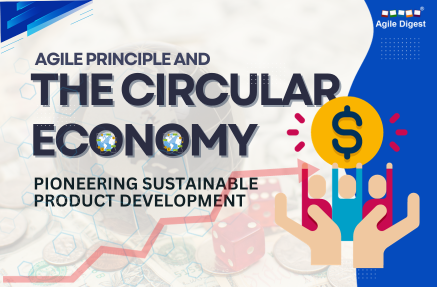Agile Principle Economy
Introduction to Agile Principles and the Circular Economy:
The transition to a circular economy, driven by the imperative to reduce waste and promote sustainability, has brought about the need for innovative approaches to product development. Sustainable product development is at the forefront of this shift, and Agile principles offer a dynamic framework for achieving these goals. In this article, we delve deeper into the synergy between Agile methodologies and sustainable product development, emphasizing iterative processes that foster eco-friendly products and the vital role Agile plays in promoting corporate social responsibility (CSR).
Sustainable Product Development:
Design for Sustainability
Sustainable product development begins at the conceptual stage. Agile methodologies encourage cross-functional teams to work collaboratively, integrating sustainability considerations from the project’s outset.
- Teams can explore ways to reduce resource consumption, utilize eco-friendly materials, and plan for responsible end-of-life disposal.
- By embracing sustainability in design, Agile teams can lay the groundwork for inherently eco-conscious products.
Life-Cycle Assessment (LCA)
Agile methodologies lend themselves well to incorporating life-cycle assessment tools into the development process. These tools enable a comprehensive evaluation of a product’s environmental impact throughout its entire life cycle.
- Agile’s iterative nature allows teams to continuously adapt and refine products based on LCA findings, enabling them to minimize environmental footprints effectively.
Iterative Processes for Eco-Friendly Products
Rapid Prototyping and Testing
Agile promotes rapid prototyping and frequent testing, which are invaluable for experimenting with sustainable design concepts.
- Early and continuous user feedback plays a pivotal role in refining the sustainability aspects of a product, ensuring that eco-friendly features meet user needs and expectations.
Continuous Improvement
Agile’s hallmark is continuous improvement through regular retrospectives. This ongoing feedback loop can be leveraged to identify and address sustainability challenges.
- Agile iterations facilitate incremental enhancements to eco-friendly product features, allowing teams to gradually optimize their products for sustainability.
Flexibility in Resource Allocation
Agile provides the flexibility needed to allocate resources effectively, especially when it comes to sustainability initiatives. As new information emerges, Agile teams can adjust their priorities.
- Sustainability objectives may require changes in resource allocation, ensuring that the organization can respond dynamically to evolving environmental and market conditions.
Agile’s Role in Corporate Social Responsibility (CSR) in the Context of Agile Principles and the Circular Economy:
Stakeholder Engagement
Agile methodologies emphasize close collaboration with all stakeholders, including customers, employees, and the broader community.
- Engaging stakeholders in sustainability discussions demonstrates the organization’s commitment to CSR, fostering trust, and promoting shared environmental values.
Transparency and Reporting
Agile’s emphasis on transparency aligns seamlessly with CSR reporting requirements. Agile teams can track and report sustainability metrics and progress systematically and transparently.
- Such transparency enhances the organization’s credibility and showcases its dedication to sustainable practices for both customers and investors.
Ethical Supply Chains
Agile principles extend beyond product development to encompass supply chain management. Agile can be used to optimize supply chains, ensuring ethical and sustainable sourcing of materials.
- This approach enables organizations to meet CSR standards and minimize the environmental impact associated with their supply chains.
Conclusion: Agile Principles and the Circular Economy::
The integration of Agile principles into sustainable product development is more than a methodology; it’s a paradigm shift toward a more eco-conscious and socially responsible approach to business. Agile’s inherent adaptability and commitment to iterative processes align perfectly with the circular economy model’s principles. By embracing Agile, organizations can not only pioneer the creation of eco-friendly products but also demonstrate their dedication to corporate social responsibility, thus contributing to a sustainable and prosperous future for all.
For more posts like this follow Agile Digest social Pages or subscribe to our newsletter:
Wesbite: https://transformation.agiledigest.com/
Facebook: https://www.facebook.com/agiledigest/
LinkedIn: https://www.linkedin.com/company/agiledigest/
Youtube: https://www.youtube.com/@AgileDigest

